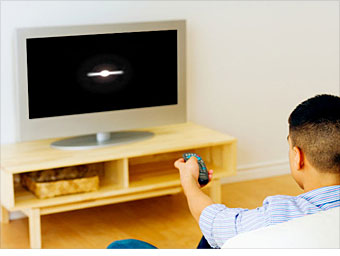Source: AlterNet - 11/27/13, Zaid Jilani

The television has long been a central fixture of the American home, starting with the introduction of basic newscasts and baseball games in the 1930s, and slowly evolving into a place where families could gather to watch films, sitcoms and premium cable channels. But data on television ratings show that Americans are increasingly turning off their televisions, as numbers show plummeting viewership.
Media analysts Craig Moffet and Michael Nathanson note that television, broadband and phone communications firms lost 687,000 subscribers during the third quarter of 2013, with the “pay-TV industry [reporting] its worst 12-month stretch ever.” During that same quarter, Time Warner Cable lost 306,000 TV subscribers.
Young people in particular are tuning out. Nielson data shows that among the 18-24 group, viewers watched an average of 21-and-a-half hours of TV a week during the second quarter of 2013, one hour less than the same quarter during 2012. When you compare it to the second quarter of 2011, it's actually a decrease of 11 percent.
This trend has been denied by some in the industry. Viacom CEO Philippe Dauman told CNBC earlier this year that he doesn't “think cord cutting is a threat...Even during the depths of the recession, cable TV subscribers remained stable.” But this isn't entirely true. The number of cable TV-only subscribers has fallen from over 44 million in the first quarter of 2010 to just over 40 million in the third quarter of 2013.
Bruce Leichtman, the president of Leichtman Research, explained the decrease in television consumers this way, pointing to television alternatives: “First-time ever annual industry-wide losses reflect a combination of a saturated market, an increased focus from providers on acquiring higher-value subscribers, and some consumers opting for a lower-cost mixture of over-the-air TV, Netflix and other over-the-top viewing options.”
In 2007, there were approximately two million households that had no televisions; by 2013 that number jumped to five million. Nielson notes that these zero-TV households tend to be younger and single. Alternatives like Netflix have continued to grow, netting just over 20 million streaming subscribers in the beginning of 2011, but nearing 28.6 million subscribers during the summer of 2013. Advertisers are starting to follow consumers, too, by “starting to divert TV ad budgets to online video.”
Some executives are admitting the reality of the decline of TV. During a third quarter 2013 earnings call, Time Warner Cable CEO Glenn Britt had this to say: “Regarding competition, well, duh, we have competition. I say that because when I first got this job 12 years ago, I think the cable industry as a whole, including our company, was in denial that we had real, viable competition. And I still hear some of my peers saying dismissive things about our competitors. And certainly, each of them has strengths and weaknesses, just as we do. However, they are around to stay, and we need to keep getting better at competing.”
The impact of this rise of the No TV movement has yet to be seen. But as Americans abandon traditional ways to receive news and entertainment, they are finding a wealth of information online for both business and pleasure. Anyone can start a simple website, but getting on cable television is a real challenge—witness how Al Jazeera had to spend half a billion dollars just to get access to cable television airwaves that Current owned.
This bold new world will likely not eliminate the role of the television in the American household, but at least make it an equal partner to the rise of Internet and mobile communications that have the potential to be far more democratic and diverse.


Comments